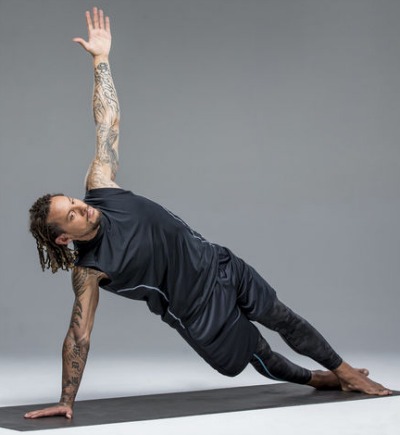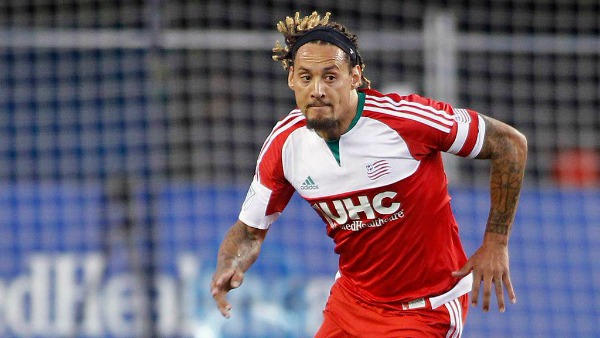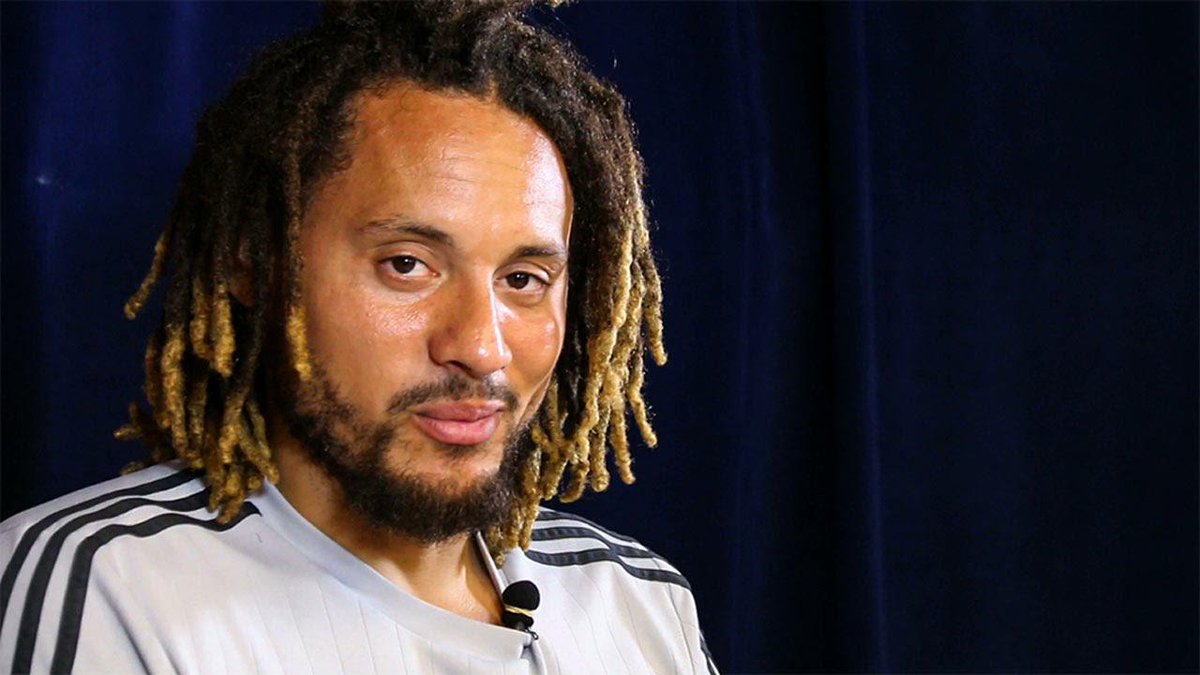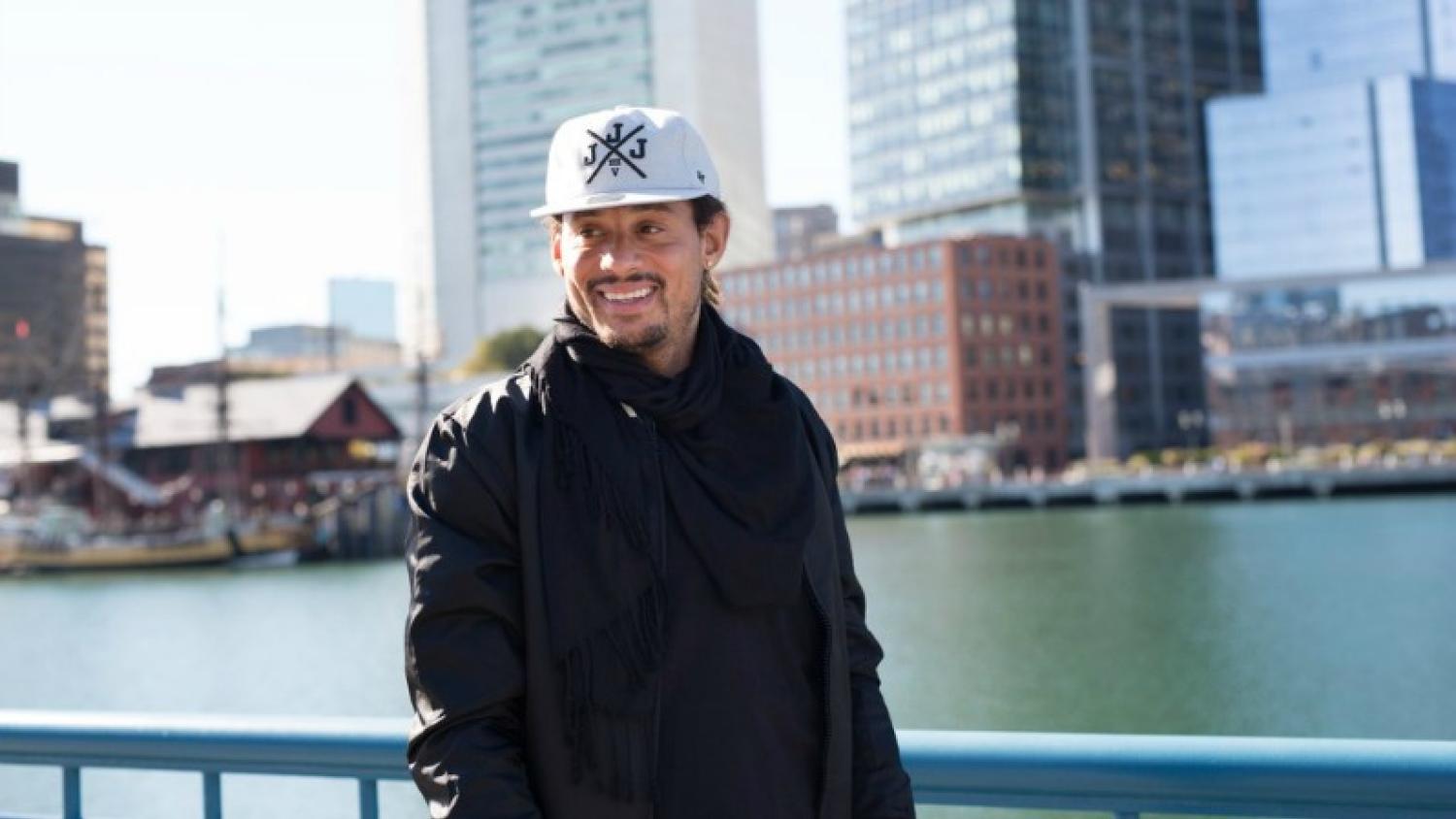Jermaine Jones played soccer in Germany, Turkey and England before he played in the country he represents as an international.
An old-school defensive midfielder for both the New England Revolution and the U.S. Men's National Team, Jones will knock you to the ground whenever he damn well pleases. He plays with an edge, and he might be on edge because he misses home.
Jones is on an adventure far away from home, even though according to FIFA he's in his home country. With New England, he's living away from his wife and children for the first time in his career. Many footballers are forced into this predicament, but few find themselves going through it in the country they actually play for. This is the situation in which Jones finds himself, and it’s been quite the ride to get here. Jones has been everywhere and seen everything, and his new adventure is conquering America.
Born and raised in Germany, Jones came up through the youth ranks near Frankfurt before joining the Eintracht Frankfurt academy. He played for Eintracht in the Bundesliga and also played for Bayer Leverkusen, Shalke 04, Blackburn Rovers and Besiktas before moving to the Revolution in 2014.
Considering the career spans of most professional athletes, Jones can already measure himself a success, in part due to his attitude toward training.
One of the things discussed a lot nowadays, not just for professional athletes but for everybody, is work-life balance. If you’re a regular person and you work long hours you’re a workaholic. If you’re a professional athlete you’re dedicated, a “gym rat.”
“Sometimes when you’re young, of course you have to live your life too,” Jones said. “But when you hit 30, boy I was, I would say when my age was like 27, 28, I started to know when you have to hear your body, when you can go out, when you need to rest.”
“It’s always nice to hang out with friends and go out and have a beer, but if you play at a high level you have to be careful how you treat your body,” Jones said. “Maybe at the age of 19 to 23 or 24, maybe you can’t feel it in your body and can go, but, if you want to have a long career, you have to be careful how to treat your body.”
With age comes wisdom, and when Jones reflects on his career he says he should have tried to take better care of his body.
“I think if I was younger, I maybe would have done it differently, maybe some nights stay in when I went out,” Jones said. “My experience says I feel better if I don’t go out, so when we’re training I focus on that.”
Jones said having children made it easier to focus on training because he wasn’t going out as much.
“My kids are more important for me too, to hold a little bit back and be more ‘dad’ and husband and stay at home, have good food and all that kind of stuff.”
Ah, yes, food. Jones clearly misses his wife Sarah's cooking. She’s a vegetarian, and makes sure Jones is healthy and well-fed.
“This is the first time I’ve really been away from my family and my wife,” Jones said. “She can cook good and everything she does is healthy and fresh, and I think that’s a big point too, to get really good meals.”
Every professional athlete gets injured, whether it be just a niggle or a broken leg. Jones has had his share of injuries, (a broken leg kept him out of the 2006 World Cup and a recent groin injury prevented him from appearing for the U.S. against the Netherlands and Germany) but he’s experienced enough to know how to make the most of his rehab and get back on the pitch as soon as possible.
“Injuries are always bad, but you have to pull them away from you head, put them out, and look always forward,” Jones said.
A main component of Jones's injury-prevention regimen is yoga. Jones, along with sports yoga instructor Kent Katich (who has worked with professional athletes from MLS, the NBA, MLB, NFL and more), created an "Athletic Yoga" program for yoga company Gaiam. Jones has said the benefits of yoga can help athletes who play any sport, even non-athletes.
“I think yoga is good, with all the movements and stretching, you keep really your muscles loose and that is a big point for soccer players,” Jones said. “You have a lot of players who are maybe more stiff than other guys and I always say that the yoga stuff helps me, with all the hamstrings and stuff like that, to stay away from injuries.”
“I’m always concerned. I’m thankful that I’ve never had a muscle injury and I think that yoga was really good for that.“

Jermaine Jones worked with Kent Katich and Gaiam to create a conditioning program for athletes. (Photo: Gaiam.com)
“When you start young and you build muscle real quick, and you don’t stretch really good, the muscle will be stiff and so yoga is exactly to that point.”
“When you start it you get that feeling, a little bit upset, like ‘this movement or that movement’s really hard and I don’t like it’ but if you go through with it and keep going you see how much you can stretch a muscle is unbelievable,” Jones said. “At the end of the day I think it’s amazing for every sport.”
Yoga still has a stigma surrounding it, seen as something more for middle-aged suburban housewives than for high-level professional athletes. That perception couldn’t be more wrong, Jones said, and — once you try it — it’s actually quite nice. The key is going that first time and not letting outside impressions influence your judgment, Jones said.
“It’s funny, I was the same way. When people told me I had to try yoga, I was like, ‘nah, man, that’s easy,’” Jones said. “But the first time you go in there and you start to do the first session, you will see. I’ll be honest, I was sweating, I was like finished, I was like ‘oh my God’ but then it’s amazing how it helps you at the end of the day.”
“I always say you have to go first, like, go, try it and then make you decision, but don’t make your decision on what people say. If you like it, if you don’t like it, it’s your decision.”
The same philosophy could be applied to his decision to play internationally for the United States instead of Germany.
“One thing that people don’t know is that I played for the youth teams for Germany, and when I was young I played for the U-20 world cup in Argentina, and after the tournament, me and my agent sat down, and I had played with (former USMNT captain Landon) Donovan at Leverkusen when we both were 22, and I told my agent that I want to play for America,” Jones said. “Like, they have this kid, and I want to try for America.”
“And he reached out to FIFA and everybody and they said no, you played already in a tournament for the youth team in Argentina so you cannot switch anymore so I was like OK, that’s the deal,” Jones said. “We tried again two years later and they still said no, so I was like OK, my focus is now to try to play for Germany.”
“Germany’s one of the biggest soccer countries, so it’s really tough to play for this country,” Jones said. “I played some friendlies, I was almost called up for the (2004) European Cup in Austria and Switzerland, and I was almost called up in 2006 for the World Cup, but I broke my shin.”
“I’m lucky that I didn’t do it at that time, and when they changed the rule my agent came back and said ‘hey they changed the rule, and if you want you can switch if it’s still in your mind’ and I told him if it’s possible, yes I want to do it.”
Having made his decision, Jones sat down with then-USMNT coach Bob Bradley.
“He was like, if you really want to play I will not say no, you’re a good player and I will take you,” Jones said. “I talked to him and said I want to play for America and there was the South Africa World Cup and he told me, I was injured at the time, ‘I will take you, 100 percent.’”
Jones ended up missing the 2010 World Cup due to injury, but he stuck with the U.S.
“If a country like America wants you, at that time I had had maybe two visits on holiday in America, but I liked it so much, and I was like ‘I want to play for this country.’”
He finally played in a World Cup in 2014 in Brazil, scoring one of the best goals in the tournament against Portugal.
Players talk about the World Cup an experience they will always remember, and for Jones that is no different.
“I would say the whole energy before the World Cup was amazing, to go through all of the qualification games, you know that something is waiting for you, where you worked for your whole career, and the biggest tournament in the World is waiting.”
“To then travel over there and go to the all the events and go to the hotel and go to the opening was a feeling that you can’t wait until the first game starts against Ghana.”
“A lot of people didn’t really have us on the list, like the group is with Portugal and Ghana and Germany, the group of death and no, America will not do it,” Jones said. “People like Alexi Lalas and other people, they were talking trash and didn’t really give us credit, and to be in that moment as one of the guys on this team and to be focused and show all the people who supported us in Brazil and maybe the people who didn’t really support us, to show them we may not be the biggest soccer country, but we come and we’re getting better and better. There was a feeling that everybody had in that moment, and this is why we beat Ghana, this is why we played a good game against Germany and we played a really good game against Portugal.”
“I always played at a high level with my club teams, Champions League and all that, and I missed the 2006 World Cup when I could have maybe made the roster for Germany and I missed the 2010 World Cup (injury) so all of my focus was on the 2014 tournament and I got to score a great goal against Portugal and my kids and my wife and everybody went to this game and to score in that game was, for me, amazing and a crazy feeling. And it will stay always in Jermaine Jones history that he scored in 2014 World Cup against Portugal, and to be a part of that, for me is crazy.”
When you score a goal that causes the Spanish-language announcer to yell "Oh my God!" in English, you are allowed to refer to yourself in the third person when discussing it.
Now that Jones is one of the elder statesmen in America soccer, the talk surrounding his career has inevitably shifted to when it will end. After the USMNT’s heartbreaking loss to Mexico in the Confederations Cup playoff Oct. 10, the chatter is louder than ever.
“It’s funny, after the last games people ask me 'when are you thinking about retiring,' and I was laughing, like, 'guys, it’s so quick,'" Jones said. “Like, after the World Cup everybody was like 'it was amazing how you played' and then I did it with my club team with the final [the Revolution made it to last year’s MLS Cup final] and it was like that again. And then you lose two games and everybody’s like, 'hey, when are you going to think about retiring?'”

After taking the New England Revolution to the MLS Final last year, Jones hopes to bring home a trophy this year. (Photo: @TheBentMusket | Twitter)
“But this is soccer, you know, it’s so funny. I tried to tell everybody, younger players, older players, everybody, about the pressure, it’s maybe starting right now that people start to go against you in the media (in the U.S.), but I think to go through all this stuff in Europe is way harder.”
“In Europe, if you have a bad game, everybody will talk about you, everybody will say it straight, with your name, not 'maybe we can play better in midfield.' No, it’s “Jermaine Jones is horrible” and then you know how it is, people read in newspapers or see it on TV, a lot of people jump straight on it.”
“And sometimes you take that. It’s hard sometimes for younger players, so I say that it’s always an up and down. You don’t have an up-up-up, there will come point where you will have a down, and so I tell younger players to learn from that, to come out of this is the best thing they can do."
“To see it from a different angle, from a club team, where you have maybe two or three players that played in Europe, and all the other guys don’t really know what happens in Europe, what we do in New England, we lose like four games, three games in a row, in Europe they will take you down for the whole week, and you can not do anything, so everyone takes you down in the media.”
“And then you see it here, like nobody cares. They say after the game what was wrong, 'yeah we lost, OK, we focus next game, see what happens there.' To younger players, sometimes they have to learn, 'it’s your job.' It is not only fun, sometimes it’s a job. If you don’t bring good work in real life at some point your boss will come and you’ll be cut, and what younger players have to understand is here you have more freedom than you have in Europe, but in Europe, if you have a guy behind you, he wants your position. If you don’t bring your game every time, you’ll be out."
“Diego Fagundez, on my team, he has the quality to really go to Europe and play, he’s 20 now, and he’s on amazing form, but I tell him all the time: 'it’s your job.'”
The New England Revolution have ridden Jones's crinching tackles and "it's your job" mentality to a playoff berth in the MLS Eastern Conference.
Earlier this season Jermaine Jones spawned possibly the greatest tifo in MLS history. Should he, Fagundez and Lee Nguyen lead New England to that which they came so close to winning last year — the MLS Cup — they Revs fans will have to think up an even better one.
Today might mark another step in that journey, but it might also mark the end. Jones and the Revolution play D.C. United tonight in a first-round knockout playoff game. If they win, Jones will need to play a two-legged conference semi-final, a two-legged conference final and a one-off final for the MLS Cup. He was so close he could tase it last year, and there's still a ton of work to be done.
And then he can go home.

Photo: @fanly_nerevo | Twitter
Contact The18 Staff Writer Sam Klomhaus at Klomhaus@The18.com or follow him on Twitter @SamKlomhaus
You can lean more about Jermaine's "Yoga For Conditioning" series below:



